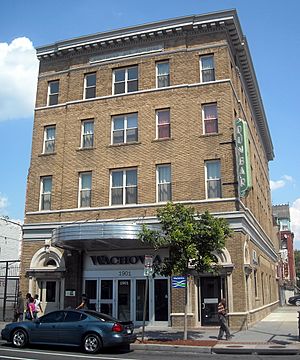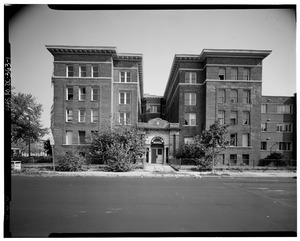Isaiah T. Hatton facts for kids
Isaiah T. Hatton (1883–1921) was a talented architect in the United States. He is famous for designing many important buildings, especially for African American communities. Several of his designs are so special that they are listed on the National Register of Historic Places. This means they are recognized as important historical sites!
Hatton was born on March 1, 1883, in Hagerstown, Maryland. His parents were Isaiah and Mary Susan Hatton. When he was seven years old, his family moved to Washington, D.C.. He later married Bertha B. Sayles.
Designing Important Buildings
Isaiah T. Hatton designed many different types of buildings. He created homes, churches, and even banks. His work helped shape communities, especially for African Americans during a time when they faced many challenges.
Notable Projects
Hatton often worked with other architects or designed buildings for important people. Here are some of his well-known projects:
- Third Baptist Church (1893): Located in Washington, D.C., Hatton designed this church with another African American architect, Calvin Brent. It is a very important historical building.
- Thomas J. Calloway House (1910): Hatton designed this home in Lanham, Maryland. It was built for Thomas Junius Calloway, who was an African American developer. Calloway helped create the Lincoln community in Lanham.
- His Own Home (1911): Hatton also designed his own house at 5502 Center Ave in the Lincoln community.
- Industrial Bank (1915): This bank building was designed for John Whitelaw Lewis in Washington, D.C. The bank was important for helping African American businesses and families. Even though it closed for a while, it was later reopened by a Howard University graduate.
- Whitelaw Hotel (1919):
This grand building in Washington, D.C. was originally known as the Whitelaw Apartment House. It later became the Whitelaw Hotel. It is another one of Hatton's designs listed on the National Register of Historic Places.
- Southern Aid Society Building (1921): Hatton designed this building in Washington, D.C.. It is also known as the Southern Aid Society–Dunbar Theater Building. This building is also listed on the National Register of Historic Places.
Isaiah T. Hatton's designs left a lasting mark on the communities he served. His buildings continue to stand as important parts of history and architecture.
 | Laphonza Butler |
 | Daisy Bates |
 | Elizabeth Piper Ensley |



